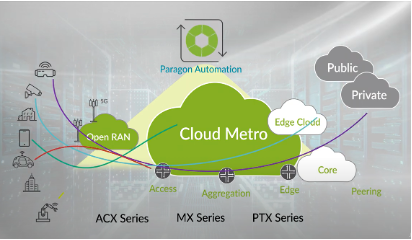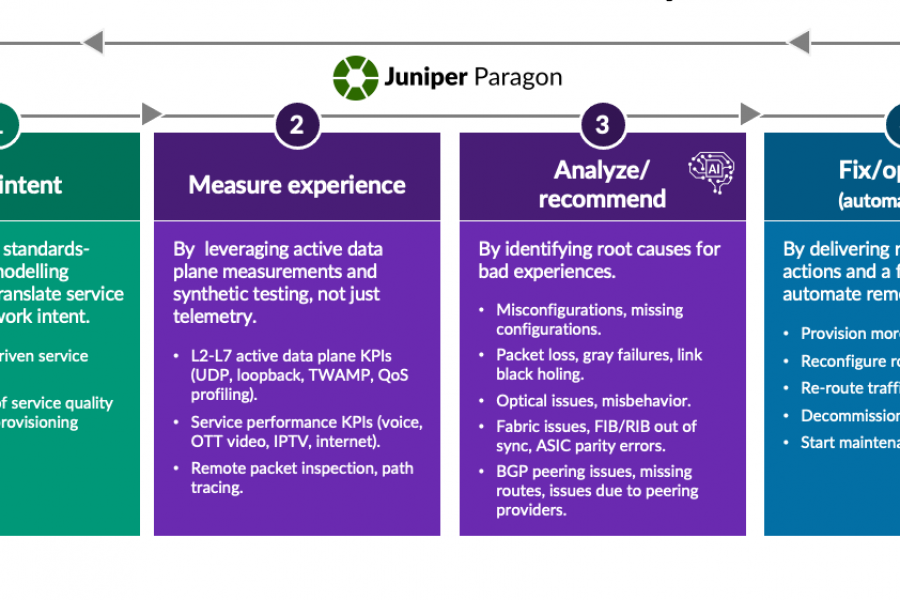Enterprise digital transformation, consumer entertainment, online services and the Internet of Things (IoT) are fueling the transition to cloud and 5G. As a result, the internet has become an even more integral part of our lives, whether in the office or at home, as we leverage it for work, school, healthcare, exercise, entertainment and so much more.
While our growing interconnectedness is good for network service providers, the pace and magnitude of the internet’s growth has become challenging as they try to keep pace. Consider the following:
- Demand for bandwidth and online services will increase traffic by 500% over the next 6 years.1
- Cybersecurity threats are on the rise, with a 71% increase in network-layer DDoS attacks year-over-year in 1Q22.2
- New sustainability (green) standards, like ITU L.1470, are emerging, requiring mobile, fixed and data center network operators to reduce greenhouse gas emissions by 45% prior to 2030.3
Supporting this projected growth rate with current cost-per-bit models will be challenging by itself, not to mention the additional cost of mitigating cyber threats and meeting sustainability expectations.
All of this is leading some to question, is internet growth sustainable?
At Juniper Networks, we believe the answer is yes. Internet growth is not only sustainable, it can also be increasingly more profitable with a Scalable IP Services Fabric approach to IP Transport that is fully automated, enabling operators to assure services from access and aggregation through the metro, multiservice edge, and core to peering sites and applications running in data centers.

A Scalable IP Services Fabric applies cloud principles to service provider networks by combining physical and virtual infrastructure with AI-enabled automation and security. Juniper’s Scalable IP Services Fabric solution combines our Cloud Metro, multiservice edge, and IP core transport platforms with intelligent automation, Connected Security and
an ecosystem of partners to deliver rapid network growth and new low-latency, real-time 5G enabled services, securely, efficiently and accurately.
As applications and services shift to the cloud, traffic patterns are becoming more dynamic, with more traffic staying in the metro. In fact, 50% of enterprise data will be created and processed in regional or edge data centers by 2025.4 Therefore, applying cloud principles that increase network agility and resiliency will be critical for service providers to sustain growth and remain competitive with their peers and over-the-top (OTT) service providers.
The question is, how?
Sustaining network growth by applying cloud principles to service provider networks starts with a diverse portfolio of agile routing infrastructure; a portfolio designed to support the dynamic traffic flows and ongoing exponential growth of modern networks. Yet, many of our competitors seem to be moving in the opposite direction, which is unfortunate, because the unique requirements of each network domain require tradeoffs to be made in silicon and platform design to optimize for best performance. A one-size-fits-all approach to network infrastructure, will not help operators achieve sustainable growth.
Juniper has embraced a multi-silicon platform strategy from its inception, and as networks have become increasingly more complex, this philosophy has proven itself over-and-over again. By leveraging merchant and custom silicon, we ensure that each of our product families is best optimized for the use cases it supports in the network.
For metro access, aggregation and data center networks, our ACX Series leverages merchant silicon to deliver the agility, security and capacity needed for the convergence of residential, business and mobile services over one network. Our MX Series multiservice edge leverages our own Trio 6 ASIC, which enables it to be the industry’s highest performing multi-service edge solutions. Trio is optimized to deliver massive logical scale, flexibility and programmability, with the densest per-slot throughput on the market. And Trio 6 consumes 70% less power than its predecessor. Our Express 5 silicon powers our PTX Series portfolio. Express 5 is optimized to deliver the industry’s highest non-blocking throughput of 28.2T in a single package for IP core transport, peering and DC interconnect use cases, while boasting 45% better power efficiency than previous versions.
However, platform diversity is not the only key to success. Sustainability also requires the efficient and effective deployment of resources within the network itself. Cloud Metro is a forward-looking approach to metro networks, which applies cloud principles by combining AI-enabled automation with physical and virtual infrastructure and security for sustainable network and business growth. And because massive growth in edge cloud and metro devices expands the potential vectors for cyberattacks Juniper has applied the Zero Trust security principles across the entire Cloud Metro architecture, including unique device identity, hardware and software attestation, and built-in data security.
AI-enabled Network Automation solutions are fundamental to increasing network efficiency, simplifying operations and ensuring exceptional end-user experiences. Today’s cloud-delivered, closed-loop, AI-powered automation solutions, like Juniper’s Paragon Automation, augment network planning, orchestration, and management, enabling network and service operations teams to better monitor, troubleshoot and repair their networks, often resolving issues before customers notice.
And with increasing cybersecurity threats, network security is a critical requirement to safeguard users, applications and infrastructure. Juniper’s Connected Security solution leverages the network itself to extend security to every point of connection – from client to workload, across the entire network – so you can reliably protect against even the most advanced attacks.
By combining these key solution components, Juniper’s Scalable IP Services Fabric facilitates the secure, assured delivery of services. Leveraging a cloud-like architecture enables service providers to shift from static to elastic capacity, and from manual to automated operations, for increased efficiency and best-in-class customer experience. As a result, network operators can reduce their TCO by up to 71%,5 which will enable them to design, build, and operate networks that power the internet today and well into the future.
Learn more about our Scalable IP Services Fabric solutions:
Scalable IP Services Fabric Video
Juniper Service Provider Solutions
Juniper IP Transport Solutions

























